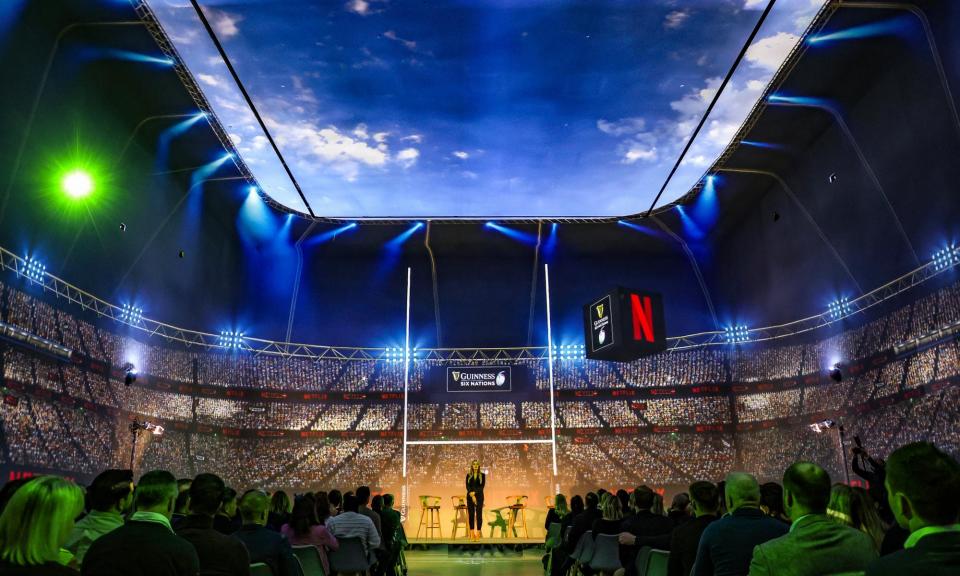
Be honest, the most compelling thing about reality TV has never been the winning. What people really want to see is a little bit of suffering, whether it’s someone being eviscerated by the judges, chowing down on kangaroo testicles, or pretending to be a cat and licking milk out of the cupped hands of the woman from Coronation Street. It’s no surprise, then, that the real star of Netflix’s new rugby series, Six Nations: Full Contact, isn’t Ireland, who won the grand slam last year, or France, who pushed them so close, but Italy, who lost all five games they played, and finished flat last.
The series ends – spoiler! – with their head coach, Kieran Crowley, reflecting on the fact that he’s most likely about to be out of a job. A caption adds that yes, just a few months later, the Italian Rugby Federation decided it wasn’t going to renew his contract. Crowley has already taken up a job with Honda Heat in Japan’s Rugby League One, but watching Full Contact you wonder if he has missed his calling. Some enterprising producer surely ought to have already commissioned a travel series featuring Crowley and his sidekick, the former Taranaki dairy farmer Neil Barnes.
Related: The Breakdown | Winds of change blow through Six Nations to spark new sense of purpose
“I’m too old for this shit,” Crowley offers, wearily, as he watches his team suffer yet another heartbreaking defeat.The New Zealander accepts Italy’s cruel run of results with good grace, partly because he has Barnes there to work as his interpreter. Barnes doesn’t speak Italian, at all, but still has a knack for being able to translate the nuances of Crowley’s moods into language everyone else can understand, “for fuck’s sake”, “hit that prick”, and, in one deathless reference to Italy’s one and only star player, Ange Capuozzo, “give the ball to Capu-whatever-his-name-is, he’s fucking quick”.
Well, at least you know Barnes wasn’t putting on airs. There’s an authenticity to Italy’s scenes that’s missing in the ones involving some of the other teams, I suspect because the team gave Netflix more access. Scotland are the other team who let the crew in behind the scenes, so we get to see the players’ faces when they learn whether or not they’ve been selected. It’s no coincidence. Scotland and Italy are the two smallest rugby-playing nations among the six, and hoped to gain the most from Netflix’s promise that the show would bring in new viewers.
The Welsh were more secretive, and after the opening rounds the English seem to almost disappear from the series entirely. Which is a loss because both had their own stories; Steve Borthwick had only just taken over as England coach and Warren Gatland, who had just made his own comeback, had to deal with the threat of a players’ strike in the middle of the tournament. All we really see of either, though, are a handful of platitudes and a series of painfully awkward staged conversations between Gatland and his wife, Trudi, about what he’s going through.
The French, meanwhile, are utterly, unmistakably, themselves. “Rugby is an art of passing the ball,” says head coach, Fabien Galthié, at one point, “with arabesques, with parabolas, with the stadium screaming at the same time.” It’s a shame we don’t get a little more of that side of the sport. The documentary makers chose, instead, to repeatedly emphasise how physically demanding it is. Arabesques? Parabolas? Are they the two who used to play second row for Beziers?
It’s one thing to hear Finn Russell describe himself as “like the Messi of rugby”, for instance, but given that you’ve got him talking, wouldn’t it be good to hear him explain what that actually means when he’s out on the pitch? Russell has a lot of screen time, but by the end of the series you’re no closer to knowing what’s actually going on in his head during the 80 minutes, why he knew to throw this pass long, or how he could see that kick was on. Likewise, the series manages to get through six hours without once even mentioning the scrum or lineout, let alone trying to explain what it’s like to be in the middle of one during a Test match.
Which is odd, given that these things are all a large part of what makes rugby union unique. The series relies, instead, on trying to sell the game by interviewing some of the players – Andrew Porter, Stuart Hogg, Ellis Genge, Seb Negri, Gaël Fickou – about their back stories. But the truth is that of all team sports, rugby union is one of the least well-suited to this sort of celebrity-driven approach. It is, as Townsend says, “the ultimate team game”, the story of a game never belongs to just one player, whether it’s a victory or a defeat, and the characters of the teams themselves matter more than those of the men or women in them.
It smells of a lack of confidence, as if the sport thinks it needs to sell itself to a new audience by pretending to be something else. By the end of the series the show has worked this out, and the strongest episodes are the ones when it becomes really clear what defeat means for Italy and Scotland in particular. The second series, if commissioned, could be spectacular if it is only a little more sure of itself and the stories it is trying to tell, if, as Barnes says to Crowley, the people involved “have the balls” to commit to it.
Article courtesy of
Source link